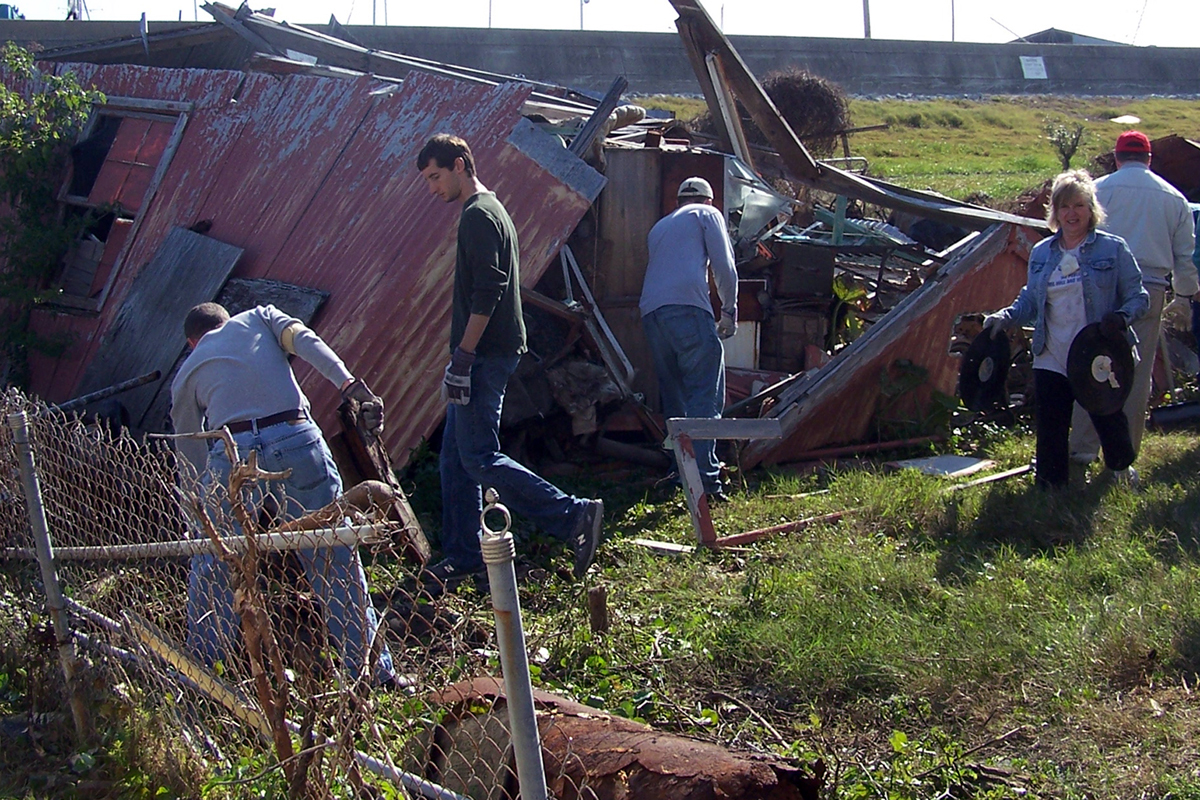
NEW ORLEANS (BP)–Flexibility is the key to living in post-Katrina New Orleans, where the task of recovery is far bigger than any one group and cooperation is crucial.
Sixty volunteers from New Orleans Baptist Theological Seminary, the Baptist Campus Ministry at Louisiana State University, Arkansas Baptist Builders and the Times-Picayune newspaper displayed both flexibility and cooperation Feb. 17 as they helped homeowners in New Orleans’ Pontchartrain Park neighborhood recover from a recent tornado and Hurricane Katrina.
“Our folks really pitched in and helped,” Ken Taylor, professor of urban missions at New Orleans Seminary, said. “My prayer had been that glory would shine to the Lord in this. I really think that has happened. [The workday] exceeded my expectations.”
The service day had been on the calendar for a month. Arrangements had been made and announcements had been posted. Originally, volunteers from the seminary were slated to tackle a few house gutting projects in the Gentilly neighborhood where the seminary is located.
But those plans changed when a destructive tornado ripped through New Orleans Feb. 13. In all, about 600 structures in greater New Orleans were damaged, and many of those were in Pontchartrain Park, near where volunteers from the seminary were already planning to work.
Much of the day was spent talking and praying with people in the neighborhood — young and old alike — who were still traumatized by the tornado. Most were just happy to be alive and eager to talk about their experiences.
“We have a lot of folks who are still shaken,” Taylor said. “We met a man — I think he was 86-years-old — we had a chance to pray with him and he was just grateful to talk with someone. He said it was lonesome in the area with the neighbors gone.”
Taylor also met Emile Segue as he was working to clean up the tornado damage on his home. Realizing that the man needed help, Taylor pieced together a team of students from other sites to help Segue. Hurricane restoration work on Segue’s house, just four blocks from the seminary, was nearly complete when the tornado deposited his neighbor’s roof in the front room of his house.
“I had a chunk of somebody’s house slam into the front, that’s really what took it out,” Segue said, pointing to the mangled front wall of his home.
Just days before the tornado negated his months of hard recovery work, Segue’s father passed away. On top of all of the emotions surrounding the hurricane and the tornado, the loss of his close family member was the most difficult to bear.
“I just buried my father that Monday. My mind was on that,” Segue said. “I’m still grieving over the death of my father. When I came up to this it was just a numb feeling, I didn’t have any reaction.”
Segue was grateful for the unexpected help.
“I pray a lot and I knew God would make a way,” Segue said. “I didn’t expect [the volunteers] today. I know God always makes a way.”
By the end of the day, Segue’s house was cleared of tornado debris and he had begun reframing the front wall. Before leaving, members of the team prayed with Segue. The volunteers were touched by his hope and determination — something evident throughout the neighborhood.
Another group cleared the backyard of Melvin and Mary Patnett, an elderly couple in Pontchartrain Park. The yard had not been clean since Hurricane Katrina and the home had roof damage from the tornado. The group, comprised of New Orleans Seminary and LSU students as well as eight Times-Picayune staff members, removed a dilapidated shed, three flood-soaked motorcycles and a number of appliances from the small yard.
Students from the seminary took turns talking with the homeowners. Before leaving they prayed with the Patnetts about the ongoing recovery and health issues they are facing.
The Feb. 17 work day was not Taylor’s first response to the needs in Pontchartrain Park. Instead of giving a planned pop quiz the day of the tornado, Taylor took his urban missions class to pray with storm victims and assess needs in the neighborhood. The class discovered practical needs.
“Nearly everyone in the FEMA trailers needs blankets,” Taylor said. “Folks haven’t replaced their [blankets and quilts] since the hurricane.”
The need was accentuated by the coldest weather of the season as temperatures dipped near freezing. The storm blew out windows in many of the FEMA trailers, leaving residents with little refuge from the cold air.
Taylor began asking around for blankets and quilts. The office of institutional advancement at the seminary and the faculty wives organization located more than 40 blankets.
Students from another of Taylor’s classes distributed blankets throughout the neighborhood on Feb 14, and a mother and her four children were among the recipients.
During a visit to the neighborhood, Taylor encountered a man who had come to help clean up his parents’ home and was asking spiritual questions. Taylor shared the Gospel with him, and there in the midst of the destruction the man made a profession of faith.
Taylor and the Arkansas Builders also talked with a Muslim man whose house was spared in the tornado. The man rode out the storm along with eight others while houses on either side were destroyed. They shared the plan of salvation with him and left him a copy of the Gospel of John.
“He was very open to talk about God,” Taylor said. “It was a good opportunity.”
At the end of the day, volunteers had worked at six different sites. Regardless of the project — large or small, planned or unexpected — each gave volunteers the opportunity to share God’s love and hope with struggling homeowners.
“It’s been comforting to them and a blessing to us to hear the testimonies of people who have seen God work in this situation,” Taylor said.
–30–

















